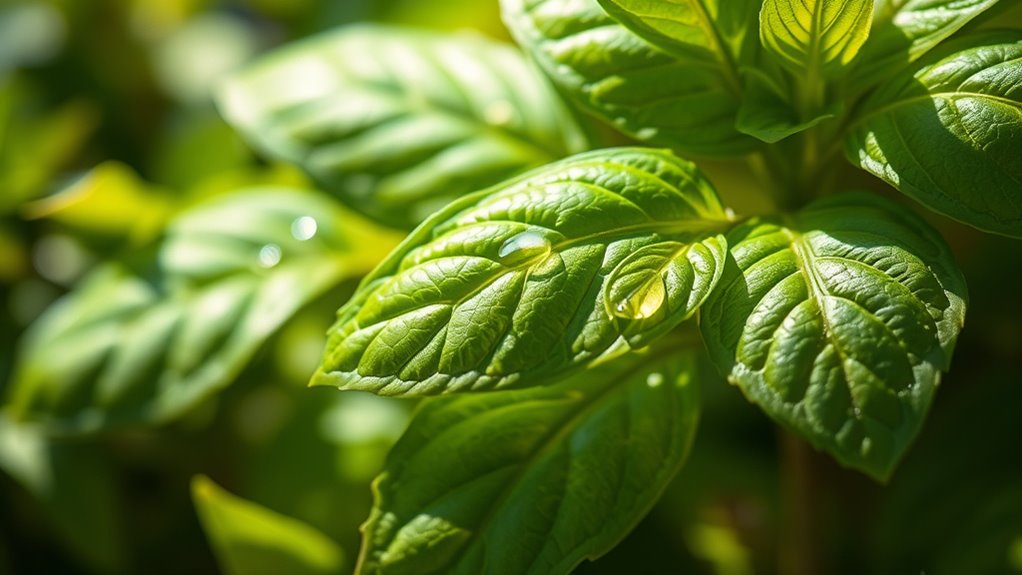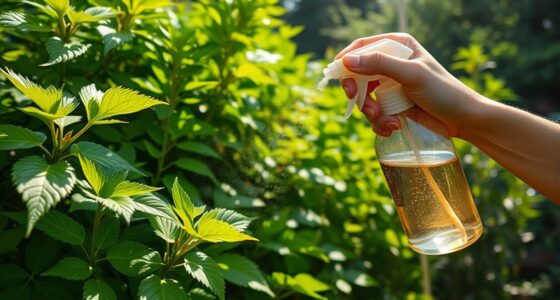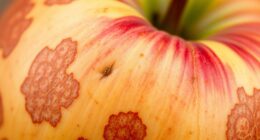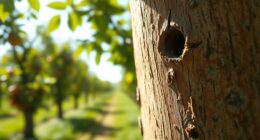To use neem oil safely on your plants, first read the label carefully and dilute a few teaspoons of neem oil in a quart of water with a gentle soap or emulsifier. Spray during cooler times like early morning or late evening and reapply every 7 to 14 days or after rain. Wear protective gear, avoid spraying in direct sunlight, and keep plants away from children and pets until dry. Keep exploring for more tips to protect your garden effectively.
Key Takeaways
- Follow label instructions for proper dilution and use an emulsifier for even mixing.
- Apply neem oil during cooler times, like early morning or late evening, to prevent leaf damage.
- Wear protective clothing and gloves during application, and keep plants away from children and pets until dry.
- Reapply every 7 to 14 days or after heavy rain for continuous pest control.
- Store neem oil properly in a cool, dark place to maintain its effectiveness over time.
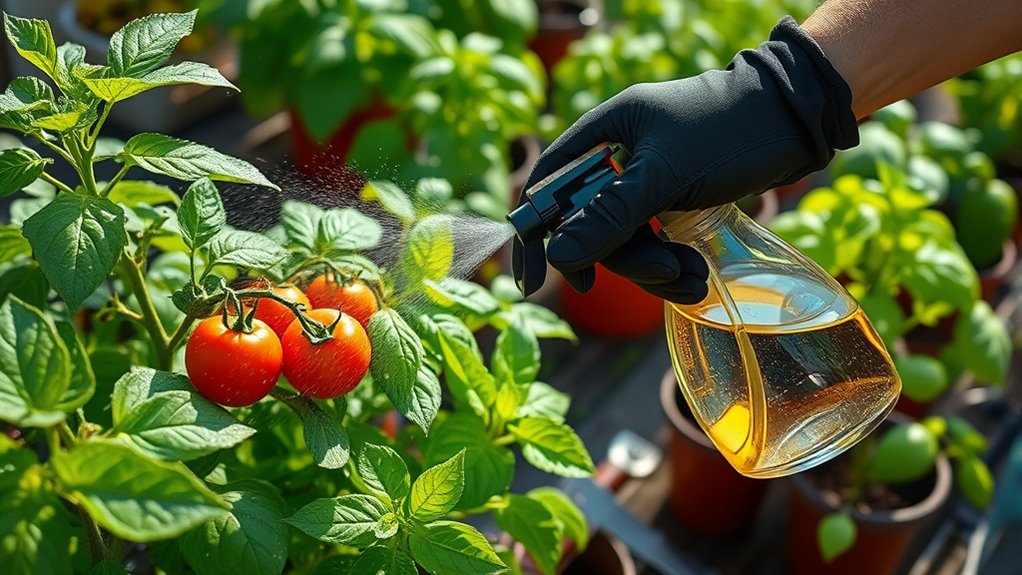
Neem oil is a popular natural remedy for pest control and plant health, but using it improperly can cause harm to your garden or skin. If you’re serious about organic gardening, you’ll want to understand how to apply neem oil safely and effectively. When used correctly, neem oil can be a powerful tool for managing common garden pests like aphids, whiteflies, and spider mites without resorting to harsh chemicals. Its natural properties make it an attractive choice for eco-conscious gardeners who want to maintain a healthy, chemical-free environment.
To get the most out of neem oil, always start by reading the label carefully. Proper dilution is essential; undiluted neem oil can burn plant leaves or cause stress, especially in hot weather. Typically, you’ll mix a few teaspoons of neem oil with a quart of water, adding a gentle liquid soap or emulsifier to help the oil blend evenly. Applying the mixture during the cooler parts of the day—early morning or late evening—reduces the risk of leaf scorch and allows the oil to work more effectively. Remember, consistency is key, so reapply every 7 to 14 days or after heavy rain.
Always read the label, dilute properly, and apply during cooler parts of the day for safe neem oil use.
When it comes to pest control, neem oil acts as both a repellent and an insect growth regulator. It disrupts the life cycle of pests, preventing eggs from hatching and larvae from maturing. This dual action makes it a versatile choice for organic gardening, where synthetic pesticides are off-limits. However, keep in mind that neem oil isn’t an instant fix; it takes time to see results, especially if pests are well-established. Regular monitoring and timely applications help keep pest populations in check without harming beneficial insects like pollinators and predatory bugs.
Safety should always be your priority. When applying neem oil, wear gloves and protective clothing to avoid skin irritation, and wash your hands afterward. Although neem oil is natural, it can cause skin sensitivity in some people. Keep the treated plants away from children and pets until the spray dries completely. Avoid applying neem oil in direct sunlight or during extremely hot weather, as this can lead to leaf damage. If you notice any negative reactions, rinse the affected plants with water and reduce the application frequency.
Using neem oil responsibly supports organic gardening by providing a sustainable, eco-friendly way to protect your plants. When used properly, it helps maintain a balanced garden ecosystem, reducing the need for synthetic chemicals. Additionally, understanding how storage conditions can affect neem oil’s effectiveness is crucial, as improper storage can reduce its potency over time. With patience and care, neem oil can become a crucial part of your pest control strategy, keeping your garden healthy and thriving without compromising safety or environmental integrity.
Frequently Asked Questions
Can Neem Oil Be Used Indoors Without Harming Pets?
You wonder if neem oil can be used indoors without harming pets. For indoor safety, it’s best to apply neem oil when pets are not nearby and guarantee proper ventilation. Keep pets away until the oil dries completely, usually within a few hours. This protects your pets from potential irritation. By following these steps, you can effectively care for your plants while prioritizing pet protection indoors.
How Long Does Neem Oil Residue Last on Plants?
When asking how long neem oil residue lasts on plants, you should consider residue breakdown and environmental persistence. Typically, neem oil residues break down within a week or two, especially with sunlight and rain helping the process. Environmental persistence is usually low, so it won’t linger long-term. To minimize residue, apply neem oil during cooler parts of the day and wash your plants if needed after a few days.
Is Neem Oil Effective Against All Plant Pests?
You might wonder if neem oil works on all plant pests, but it’s important to understand its plant pest spectrum and limitations. Neem oil effectively controls many soft-bodied insects like aphids, whiteflies, and spider mites, but it doesn’t target all pests, such as beetles or caterpillars. Its restrictions mean you should identify pests accurately and consider integrated pest management for complete protection. Always follow label instructions for best results.
What Are the Signs of Neem Oil Overuse on Plants?
If you overuse neem oil, you might notice signs of overuse symptoms like leaf curling, yellowing, or browning, indicating plant distress. Your plants could also show slowed growth or wilting. These symptoms suggest you’ve applied too much or too frequently. To avoid this, stick to recommended amounts, monitor your plants closely, and give them time to recover if you spot any distress signs.
Can Neem Oil Be Mixed With Other Garden Pesticides Safely?
Imagine discovering a powerful way to boost your garden’s health—mixing neem oil with other pesticides. But beware: not all pesticides are compatible; some can react dangerously. Always check pesticide compatibility before mixing, and stick to recommended mixing ratios to avoid harm. If unsure, test a small batch first. Safety is key—your plants and your garden’s future depend on it.
Conclusion
Now that you know how to use neem oil safely, you can protect your plants without risking harm. Think of it as a gentle shield—powerful enough to keep pests at bay, yet delicate enough not to damage your greenery. With proper application, you’re fostering a healthy, vibrant garden. So, embrace neem oil as your natural ally, balancing the line between control and care, ensuring your plants thrive in harmony with nature.
